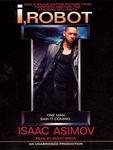
 Hitchhiker’s Guide to the Galaxy: Live in Concert
Hitchhiker’s Guide to the Galaxy: Live in Concert
By Douglas Adams; Performed live by Douglas Adams
2 cassettes – 2 hours – LIVE PERFORMANCE, UNABRIDGED EXCERPTS
Publisher: Dove Audio
Published: 1996
ISBN: 0787108960
Themes: / Science Fiction / Humor / Time Travel / Robots / Artificial Intelligence / Alien Invasion /
In 1995, at the Alameida Theatre in London, Douglas Adams gave a live performance, reading several sections from the first three novels of the inaccurately named Hitchhiker’s Trilogy. The performance was recorded, and the result is one of the most oft-played in my collection. His reading is absolutely hilarious. His energy is high throughout the performance, and his comic timing impeccable.
Amongst the episode segments Adams reads are “Marvin and the Frogstar Battle Robot”, “Arthur and the Irrational Sofa”, and “Agrajag and the Cathedral of Hate.”
Hitchhiker’s Guide remains the best science fiction comedy out there. How to describe it? Well, this fellow named Arthur Dent wakes up one day to discover that someone is trying to knock down his home to make room for a bypass. While dealing with that, he discovers that his good friend Ford Prefect is not actually from Earth, but from somewhere in the vicinity of Betelguese. Further, the Earth itself is about to be destroyed by the Vogon Destructor Fleet to make room for an interstellar bypass. They get off-planet and the adventures commence aboard the Heart of Gold, which is run by an Infinite Improbability Drive, which… well, you just have to experience it.
Unabridged audio versions exist of all the Hitchhiker’s novels, but my favorite ways to enjoy this story is the original BBC Radio dramas and this live performance. A person who enjoys Hitchhiker’s already should very much enjoy this, and it would also offer a good introduction to someone who is unfamiliar with the story.
Posted by Scott D. Danielson



 The Pyramid of Amirah
The Pyramid of Amirah